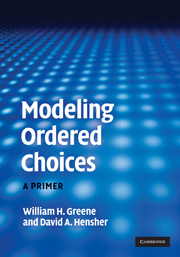Book contents
- Frontmatter
- Contents
- List of tables
- List of figures
- Preface
- 1 Introduction: random utility and ordered choice models
- 2 Modeling binary choices
- 3 A model for ordered choices
- 4 Antecedents and contemporary counterparts
- 5 Estimation, inference and analysis using the ordered choice model
- 6 Specification issues and generalized models
- 7 Accommodating individual heterogeneity
- 8 Parameter variation and a generalized model
- 9 Ordered choice modeling with panel and time series data
- 10 Bivariate and multivariate ordered choice models
- 11 Two-part and sample selection models
- 12 Semiparametric and nonparametric estimators and analyses
- References
- Index
6 - Specification issues and generalized models
Published online by Cambridge University Press: 05 June 2012
- Frontmatter
- Contents
- List of tables
- List of figures
- Preface
- 1 Introduction: random utility and ordered choice models
- 2 Modeling binary choices
- 3 A model for ordered choices
- 4 Antecedents and contemporary counterparts
- 5 Estimation, inference and analysis using the ordered choice model
- 6 Specification issues and generalized models
- 7 Accommodating individual heterogeneity
- 8 Parameter variation and a generalized model
- 9 Ordered choice modeling with panel and time series data
- 10 Bivariate and multivariate ordered choice models
- 11 Two-part and sample selection models
- 12 Semiparametric and nonparametric estimators and analyses
- References
- Index
Summary
Anderson (1984, p. 2) discusses the inadequacy of the ordered choice model we have examined thus far:
We argue here that the class of regression models currently available for ordered categorical response variables is not wide enough to cover the range of problems that arise in practice. Factors affecting the kind of regression model required are (i) the type of ordered categorical variable, (ii) the observer error process and (iii) the “dimensionality” of the regression relationship. These factors relate to the processes giving rise to the observations and have been rather neglected in the literature.
Generalizations of the model, e.g., Williams (2006), have been predicated on Anderson's observations, as well as some observed features in data being analyzed and the underlying data-generating processes.
It is useful to distinguish between two directions of the contemporary development of the ordered choice model. Although it hints at some subtle aspects of the model (underlying data-generating process), Anderson's argument directs attention primarily to the functional form of the model and its inadequacy in certain situations. Beginning with Terza (1985), a number of authors have focused instead on the fact that the model does not account adequately for individual heterogeneity that is likely to be present in micro-level data. This chapter will consider the first of these. Heterogeneity is examined in Chapter 7.
- Type
- Chapter
- Information
- Modeling Ordered ChoicesA Primer, pp. 181 - 207Publisher: Cambridge University PressPrint publication year: 2010



